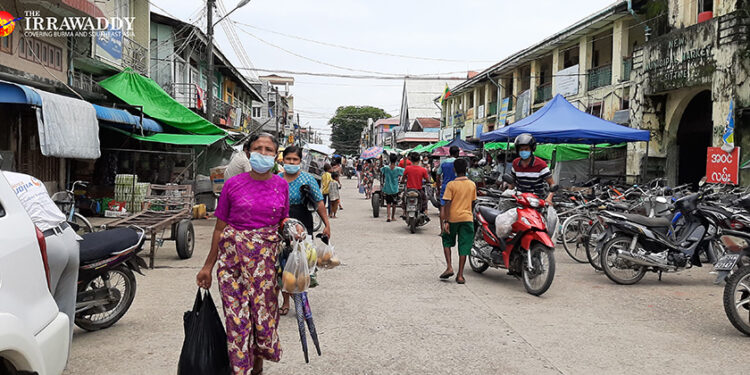YANGON—Local lawmakers and civil society organizations are calling for the resumption of full mobile internet services in Rakhine State after 82 cases of COVID-19 were reported there over the past week, saying residents’ inability to access online information about the outbreak could worsen the situation.
In June 2019, the Myanmar government imposed an internet blackout in eight townships in Rakhine State—Ponnagyun, Rathedaung, Mrauk-U, Kyauktaw, Minbya, Myebon, Maungdaw and Buthidaung—and in Chin State’s Paletwa Township, citing security concerns and the need to curb hate speech amid fighting between the Myanmar military and the Arakan Army (AA).
The government resumed mobile internet services in those townships in early August, but the network is limited to 2G service, so local residents cannot access educational messages and real time information issued by the Ministry of Health and Sports about COVID-19. As such, local lawmakers and civil society organizations have been calling for the resumption of full mobile internet service in Rakhine State.
Rakhine State parliament lawmaker U Tun Tha Sein of Mrauk-U said local residents have to rely on phone calls and have barely any access to real time information about the pandemic.
“We only found out about the COVID-19 case in Mrauk-U after [someone] from Sittwe told us by phone. Only then did the whole township learn that a confirmed COVID-19 case had been detected in our town,” the lawmaker said.
The lawmaker also expressed concern that as many as 200,000 internally displaced persons (IDPs) could be at risk in Rakhine State.
“IDPs are forced to live in crowded conditions. They have no masks or hand gel. As mobile internet services are not available for public use, they don’t receive educational messages shared online. If an IDP camp is hit by the coronavirus, it could be quite lethal and cause many problems,” U Tun Tha Sein said.
Mrauk-U Youth Association chairman Khaing Min Shin said the 2G connection is too slow to allow users to read news reports online.
“The resumed internet service is not convenient for reading news reports. I can barely read the Facebook newsfeed with it,” he told The Irrawaddy.
Local residents are at risk of receiving misinformation due to the limited access to internet services, Khaing Min Shin said. “We have had difficulty verifying news reports since the internet blackout [was imposed]. There is misinformation, including that [COVID-19] cases have been confirmed, when the results have not yet been released,” he said.
“As we have no access to information at all, we are very concerned that [the coronavirus] will spread more quickly, and about what to do then. So we want to ask the government to provide full 4G internet,” he added.
Daw Wai Phyo Myint, senior digital rights officer at Phandeeyar, a Yangon-based organization that promotes tech investment and innovation, said the group had constantly pushed for the resumption of mobile internet services since COVID-19 cases were first reported in Myanmar, but authorities simply replied that phone calls and SMS messages could be used instead of the internet to communicate and inform, and that lower-level authorities were traveling around wards in the state informing members of the public over loudspeakers about the need to protect themselves against COVID-19.
“What they said might have been true some 10 years ago. But today, people will not be satisfied with information over a loudspeaker. They want information from all sources. It is impossible for them to get the same amount of information as other places without internet access,” she told The Irrawaddy.
“We would like to urge the government to resume 4G internet, while providing health care services, so that people can get the information and support they need,” she added.
According to Saw San Nyein Thu, the chairwoman of the Rakhine Women’s Initiative Organization, most residents elsewhere in Rakhine are unaware of the situation regarding COVID-19, even as scores of confirmed cases were reported in Sittwe in the space of a week.
“I made a phone call to Rathedaung this morning. They don’t think the situation is that bad. While there is a growing sense of alarm in Sittwe, [residents in] other townships are not very aware of the situation. They don’t know about travel restrictions. This is a real cause for concern,” she said on Monday.
Local residents have not been able to verify news online due to the lack of internet access, she said. “Hearsay can worsen misinformation. It is important to have internet access so that people can read news reports themselves,” she added.
Translated from Burmese by Thet Ko Ko
You may also like these stories:
Myanmar’s Rakhine State Reports 72 Local COVID-19 Transmissions in Eight Days
Myanmar’s Rakhine State Capital Under Partial Lockdown Due to Spike in Local COVID-19 Transmissions
Three More Local COVID-19 Transmissions Reported in Myanmar’s Rakhine State

















